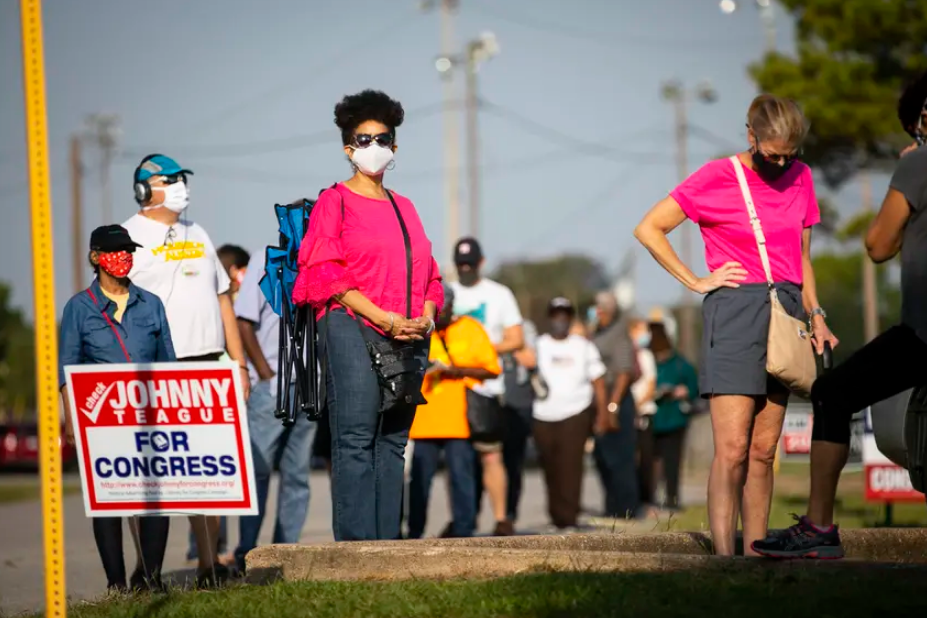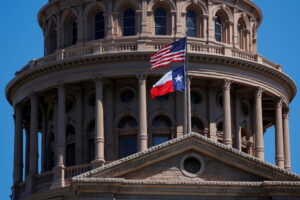Democrats fear Texas Republicans will push even harder in second bid to pass new voting restrictions
7 min read
Democrats knew the risk when they walked out en masse in May, breaking the House quorum as the regular legislative session wound down and temporarily derailing Republican efforts to make voting in Texas harder.
In the five-and-a-half weeks since they won that battle, political and legal steering currents have shifted, and those hoping to forestall the GOP’s determination to enact new voting restrictions face a wider war as the legislature convenes Thursday in special session.
A second GOP primary contender has emerged to challenge Gov. Greg Abbott‘s reelection bid next year from the right, and Abbott appears to be hardening to protect his conservative flank.
Ruling on an Arizona voting right case, the U.S. Supreme Court weakened one of the few legal mechanisms left to safeguard people of color from discriminatory voting restrictions imposed by states.
And Republican leaders found a wellspring of energy in their ongoing crusade against a reading of the past that acknowledges and confronts the role of racism in Texas history and how it continues to shape the state.
Those developments have raised the stakes for the special session, setting up the possibility that whatever version of voting legislation passes will be even more restrictive than Senate Bill 7, the bill in play when Democrats staged their walkout.
“That was the threat that they made before we walked out,” state Rep. Nicole Collier, D-Fort Worth, said in a recent interview with The Texas Tribune. “They said, ‘you know, if we have to come back, this bill will be worse.’ We saw some of the harmful provisions in the original Senate version, and we expect for them to bring those back.”
The failure of Texas Republicans to pass new voting restrictions, while conservatives with less of a stranglehold on power in other states succeeded, was a remarkable stumble in the GOP’s nationwide response to the 2020 election and former President Donald Trump’s baseless claims that its outcome was undermined by fraud.
Beyond Trump, Texas Republicans have their own incentive to tighten voting rules. With their statewide margins of victory eroding, they have two opportunities this year to pass laws that might prolong their hold on power. The second, drawing Congressional and state legislative districts, won’t be engaged until a later special session this year.
But the first effort, passing new voting restrictions under the banner of “election integrity” that appear likely to make voting harder predominantly for Democratic voters — including urban voters of color and other marginalized groups — begins in earnest again Thursday.
Lt. Gov. Dan Patrick on Wednesday indicated Republicans would proceed swiftly in their second bid to pass the restrictions, with a Senate committee meeting as soon as Saturday on the voting bill that’s expected to be reconstituted as Senate Bill 1. During the regular session, the Senate started with a much broader bill compared to the slimmer set of restrictions favored by the House.
In its opening proposal for the special session, the House appeared to already have expanded the restrictions it passed during the regular session. House Bill 3 embraces several of the Senate’s earlier restrictions, including two targeting Harris County’s voting initiatives, and a new ID requirement for mail-in voting that was added to SB 7 at the last minute.
The Senate had not revealed its first pass at the legislation as of Wednesday evening.
The bill Democrats defeated, SB 7, would have brought sweeping changes to Texas elections by restricting voting hours, narrowing local officials’ control of elections, further tightening the rules for voting by mail and bolstering access for partisan poll watchers. Other provisions in the wide-ranging bill would have created new offenses or heightened penalties for local elections officials and those who help voters cast their ballots.
That massive bill was the final product of backroom negotiations between Senate and House Republicans during which lawmakers added new restrictions, including some that were not previously considered in public. Heading into the special session, SB 7 is what some Republicans were eyeing as a starting point.
“We really worked hard to get to a good conference committee report,” said state Rep. Travis Clardy, referring to the final version of the bill the Nacogdoches Republican helped craft during those negotiations. “What I really hope happens is we have the opportunity to lay out a clean bill, point out ‘here are some concerns that were raised appropriately so’ and ‘here’s how they’ve been addressed and cleaned up.’”
Clardy is among the Republicans who, since the Democrats’ walkout, have retreated from two controversial provisions added out of public view. One proposal would have lowered the legal standard for overturning elections through the courts, which has led to Republican infighting over who was responsible for including it in the bill.
Another included new limits to Sunday early voting hours, including a 1 p.m. start time, that were derided as an attack on “souls to the polls” efforts focused on Black churchgoers. Republicans later blamed the new rule on a typo, alleging it should’ve been printed as 11 a.m., even though they defended the change publicly.
“Before the regular session ended we probably had, on both the House and Senate side, too many cooks, too many fingers in the pie,” Clardy said. “Mechanically, it should’ve been winnowed down and been simpler.”
Patrick continued the squabbling in a press release Tuesday by blaming the House for the Sunday restrictions, but he made clear they were no longer on the table in the Senate.
Since the walkout, the lieutenant governor has continued to defend Republicans’ work as an effort to standardize election procedures, including by zeroing in on Harris County’s 2020 efforts to expand local voting options, and safeguard the voting process from irregularities.
“We wanted to be sure we have full verification of mail-in ballots and again making sure people who say they are going to vote and are voting are the people they say they are,” Patrick said in a Fox News interview earlier this summer. “This is not voter suppression.”
The outcry over those two provisions largely overshadowed voting rights advocates’ broader concerns with other last-minute additions to the legislation, including new ID requirements for voting by mail and a possibly higher threshold for who can qualify for a mail-in ballot based on a disability. But without the votes to block the legislation altogether, some Democrats have taken those concessions as a partial win from the walkout.
Still, Democrats remain concerned about the potential return of other controversial rule changes that had been edged out of the bill.
An earlier version of the legislation would have allowed partisan poll watchers to video record voters who receive assistance filling out their ballots. That provision raised concerns about the targeting of voters with disabilities and those who speak languages other than English who could be more likely to require help.
Republicans had also attempted to establish a new formula for the distribution of polling places in the handful of mostly Democratic counties with a population of 1 million or more. A Texas Tribune analysis showed voting options under that proposal would have been most curtailed in areas with higher share of voters of color.
Democrats and voting rights advocates have also indicated they remain wary of potential new additions related to voter registration rules, including an effort to write the state’s botched 2019 effort to review the voter rolls for supposed noncitizens into law or increased citizenship checks that would target naturalized citizens.
We saw them “stripping out agreed upon amendments by Democrats, and adding new provisions that never even went through committee,” said state Rep. Jessica González, the Dallas Democrat who served as vice chair of the House elections committee. “We don’t expect for that to be any different.”
But the renewed debate over what may make it into Republicans’ bill will not take place in a vacuum.
In upholding a pair of Arizona laws challenged as discriminatory against voters of color, the Supreme Court earlier this month handed down a ruling legal experts largely agree gives states more leeway to impose new voting restrictions without running afoul of the federal Voting Rights Act.
The ruling signaled to the courts that they could be more receptive to lawmakers’ stated reasons for passing new restrictions — to prevent fraud in elections, for example, as Texas Republicans have claimed — instead of relying on a new law’s disparate impact on voters of color.
Perhaps casting an equally long shadow over the voting debate is the GOP’s ongoing efforts to tamp down public discussions of racism in Texas history and the enduring discriminatory practices that have resulted from it.
Much of that fight in recent months centered on a new law restricting how the history of racism and its ties to current events can be taught in Texas schools. Abbott instructed lawmakers to further build on that legislation during the special session. But it has also made way for new controversies over Republicans’ objections to which parts of history can be discussed at the state history museum. Last week, Patrick took credit for the abrupt cancellation of a promotional event at the Bullock Texas State History Museum for a book that interrogated the role of slavery in the lead up to the Battle of the Alamo.
For some Democrats, those historical threads are inextricably intertwined with the debate over voting restrictions.
“It’s an attempt to whitewash history, but we don’t know what mistakes not to repeat if we don’t learn our history,” Collier said. “All these things are tied together.”
This article was originally posted on Democrats fear Texas Republicans will push even harder in second bid to pass new voting restrictions







